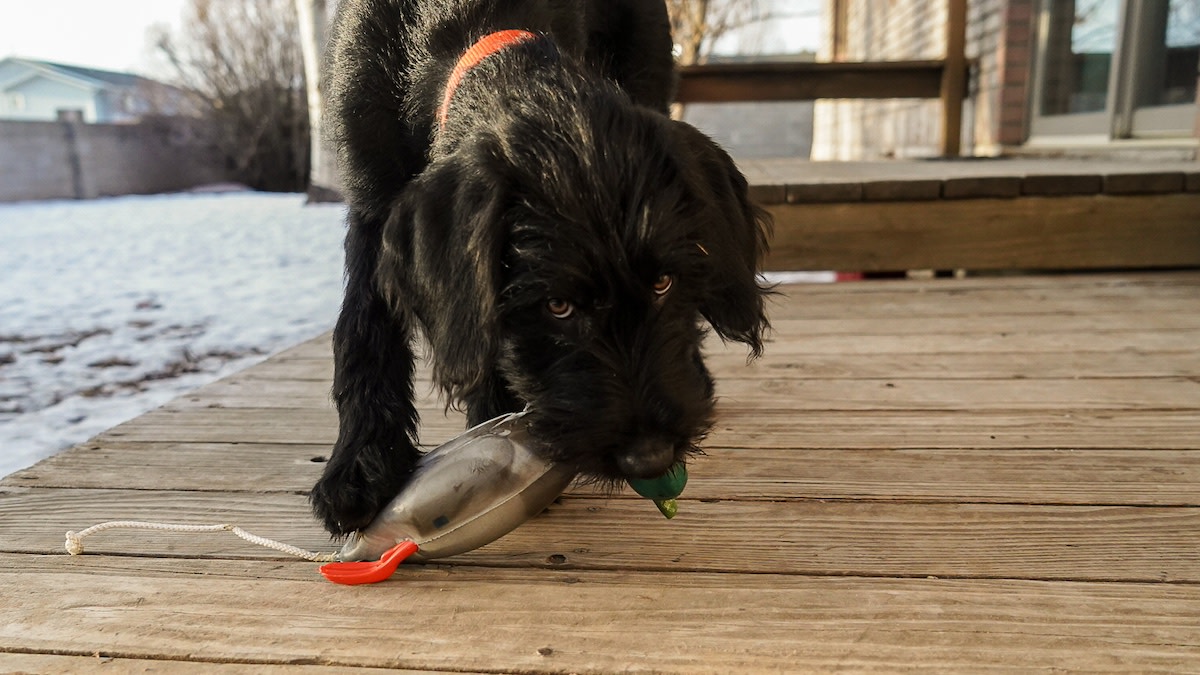
I’ve wanted to train a bird dog for years. This past season, all it took was a few rough retrieves of falling through ice or slugging through hip-deep mud to realize the time had arrived. When I began consuming every bit of information I could on puppy training, I was a bit put off by one piece of advice from legendary dog trainer Tom Dokken—they don’t need toys.
Bringing what I knew would be a high-energy puppy into my house, I had nightmares of gnawed-on trim, chewed-up computer cords, and expensive gear tattered by sharp little teeth. “How will I keep this pup entertained?” I languished. I’ve grown up with dogs, and every pup had an arsenal of squeaky, silly toys to use as a distraction when they started getting naughty.
But here’s the thing about training a dog that is going to have a job: every moment is an opportunity for learning. Instead of being overwhelmed by the inevitable energy of your pup, capitalize on that growing brain and strong, need-to-please behavior with these tips.
Puppy Proof Your Place and Don’t Skip Crate Training
This is an obvious step but an important one. Pick up your home and make things harder for your puppy to get into. Laundry is my least favorite chore, which often results in a large pile of dirty clothes on my floor. Well, that doesn’t fly with a young, curious dog around.
These don’t have to be drastic changes. Just pick your dirty socks up off the floor, and if you have something like a messy gear room, consider keeping that door shut. Set yourself and your puppy up for success by removing unnecessary, tempting situations.
I know it’s not a possibility for everyone, but it is really helpful to have a fenced-in yard where your pup can safely hang. Make sure there’s nothing dangerous out there for them to get into or places they can easily escape. I’m a big advocate for dog doors as well. I think it gives them a sense of independence while speeding up potty training, and they can choose to go run some hot laps outside instead of chewing up your couch cushions.
You’ve probably already heard this, but crate training is essential. It provides your pup with a safe place at home (and on the road) and helps immensely with the potty training process.
"A lot of puppy owners think crates are cruel, but they're not,” MeatEater’s Tony Peterson said. “Dogs are den animals, and if you have a crate that is appropriately sized, they'll quickly view it as a comfortable, safe spot. This is great for establishing a routine with downtime and for getting your pup comfortable with its new life in your house. It's also a necessity for travel."
A Tired Pup is A Good Pup
Get your pup out for a walk. Let’s be honest; you’ll feel better after some fresh air and a bit of extra oxygen in your lungs, too. You don’t need to climb mountains to get a young pup tuckered out, and if you plan ahead, it’s totally reasonable to fit a couple of short walks in throughout the day.
I think off-leash is best. Your puppy will get to expend a bit more energy than if they were on a leash, and you can keep a handful of kibble in your pocket and work on recall, heel, and other commands while wearing out your pup.
But leash training is important as well. Find the time and the places to do both and make it an essential part of your daily routine.
Bugging You? Bust out the Bumper
If your puppy starts dragging shoes around or is staring at you and chewing on your pant leg, he’s probably just bored (I’d wager you are, too) and trying to get your attention. So take a minute for a little “training snack.” This will distract your pup from whatever mischievous behavior they’re engaging in and re-focus that energy somewhere better.
Young pups have a really short attention span, and training sessions shouldn’t be too long anyway. So take five minutes to work on something. A hallway is a great place to practice retrieves. Do a quick training sesh in the backyard on the long leash. Work on “place” while you’re cooking dinner. The little things add up.
Give Your Pup a Puzzle
Sometimes, you really need to get things done around the house, have a meeting where you can’t be disturbed, or just need a minute to yourself. Puzzle toys that require some brain work from your pup to get a reward are great hands-off entertainment. And if the weather is crummy, they can offer some mental stimulation.
You can also set up puzzles for your dogs without forking out the dough for expensive toys. Hide sheds out in your yard for them to find (you can also do this inside). Or hide some pieces of kibble around for your pup to sniff out. Get creative.
Puppies are Awesome
If you’re getting bogged down by the endless energy from your pup, just remember that it won’t last forever. And before you know it, his face will start to gray, and you’ll be wishing your best pal still had that never-ending vigor.
So embrace the chaos. Roll around on the floor and play with them, get outside with them, and learn with them. They’re sponges for information at a young age, and like most things in life, you’ll get what you put into it. A stimulated, engaged pup is going to make a better blind buddy down the line.




